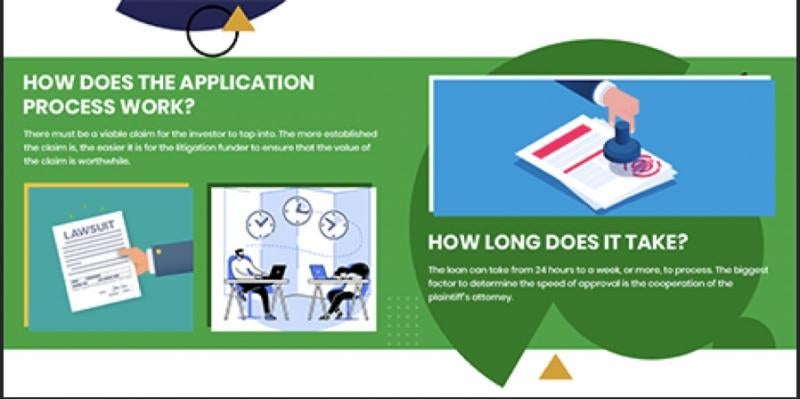We’ve all seen the commercials. “Get cash now!” Someone touts a way for consumers to cash in an annuity, a structured settlement, or even lottery winnings, and get their money so that they can use it now rather than having to wait years to obtain the benefits.
Litigation funding, or lawsuit loans, work in a similar way, with one big difference. They allow plaintiffs to gain access to a portion of the value of their cases before the final determination becomes a liquidated amount. In exchange for part of the plaintiff’s eventual award, funding companies buy into lawsuits by advancing funds in the present in anticipation of a positive future outcome for the plaintiff.
The lawsuit funding industry is only about 20 years old, but it has hit the mainstream. More and more litigants are looking to lawsuit funding companies to cash out before they cash in. Lawyers new to the personal injury game can start here to learn how litigation funding works and whether it works for their clients.

Is it a Lawsuit “Loan” or is it an Investment?
Although they are often called lawsuit loans, these funding transactions are not loans at all. They are non-recourse, meaning that the plaintiff will not have personal liability on the transaction, even if the plaintiff loses the case. If the case settles or the plaintiff is awarded a judgment, the litigation funding company is “repaid”, or rather recoups its investment out of the proceeds plus some added value or interest. The plaintiff who loses a case is almost never required to pay it back to the litigation funder.
Of course, litigation is never a sure thing, the decision by a litigation funding company to enter into a pre-settlement transaction requires careful consideration. Rather than concentrate on the customer (since this is not a loan, we hesitate to use the word “borrower”), that consideration centers on the many variables that can alter the outcome of the litigation.

Where Does the Money Come From?
The litigation funder solicits investment money from interested individual and corporate investors, sometimes to be earmarked for particular high-dollar litigation; sometimes to contribute to a pool from which the funding company draws to pay advances in smaller cases.
How Much of an Advance Can a Plaintiff Expect?
There are many reasons why a lawyer might have included a demand for $1 million in a lawsuit. A lot of those reasons have little or nothing to do with the true value of the lawsuit or how much damage the plaintiff suffered. Despite the high dollar demand, a consumer lawsuit loan transaction will likely be in the $5,000 to $10,000 range, although they can go higher. Most plaintiffs use the money to get them over a financial hurdle, pay living expenses, or cover medical treatment.
Must a Lawsuit be Filed?
There must be a viable claim for the investor to tap into. The most efficient way for the litigation funding company to determine if the claim is worthwhile is to review the materials that have been filed with a court. That means that the attorney has evaluated the cause of action, determined that the plaintiff has suffered damages, that the defendant can be held liable, and that a settlement is likely or a judgment can be collected. The more established the claim is, the easier it is for the litigation funder to ensure that the value of the claim is worth its while.
Under rare circumstances, a lawsuit lender will enter into a funding transaction with someone who is involved in a class-action lawsuit or has filed a claim in a bankruptcy case like the Boy Scout abuse matter or other type of proceeding like the ones designed to compensate the victims of wildfires caused by PG&E transmission lines in California. Those claims often require extensive documentation that a funding company can use to evaluate the claim.

How Long Does the Application Process Take?
The litigation loan can take from 24 hours to a week to process, and at times even longer. Personal injury litigation is messy. Some plaintiffs take an active role in the case and demand constant updates. Others have trouble grasping the complexities and are content to know little more than they have an attorney who filed some kind of lawsuit. The litigation loan company must go beyond the plaintiff’s application to learn about the nature and potential of the lawsuit.
The cooperation of the plaintiff’s attorney more than any other factor will determine the speed with which a litigation funding transaction is approved. They are expected to provide copies of the suit papers, discovery, and anything else the underwriter needs to determine whether the matter is suitable for the company’s purposes. The longer it takes an attorney to turn over documents to the litigation funding company, the longer it takes to make an underwriting decision (and the more client telephone calls and emails the attorney and the litigation funding company will suffer in the meantime). But, once the loan company obtains sufficient documentation, the underwriting decision comes quickly.
Are Litigation Loans Good for the Plaintiff?
Generally, lawyers are in favor of the loans. Many customers look to lawsuit lenders when they hit a rough patch in the road. Often personal injury claimants suffer from medical issues and unemployment. These stressors cause money resources to dry up quickly and often lead the plaintiff to consider an early settlement before the case has been fully developed. An infusion of cash from a lawsuit loan can spell the difference between taking the defendant's first offer or holding out for an amount that more accurately reflects the case’s damage claim.
Does It Matter How the Plaintiff Intends to Use the Money?
No. Clients can use the money for whatever they want. These are not traditional loans that require repayment. Rather, they are almost exclusively non-recourse transactions. As a consequence, the litigation funding company has little interest in why the plaintiff wants the money. Likewise, the underwriting decision does not rely on the customer’s creditworthiness since the litigation funder will look to settlement proceeds or a judgment award and not the customer directly for repayment.
What Kinds of Cases Make for Good Litigation Funding Transactions?
Personal injury cases, like auto accidents and premises liability, are the bread and butter of litigation funding. Some companies venture into medical malpractice, products liability, employment discrimination, and even whistleblower actions. The bigger and more involved the case, the more investigation and time it will take to make a decision to fund an application. But then, complicated cases have the potential to generate a better return on investment.
Are Litigation Loan Transactions Regulated?
For the most part, they are not regulated. What little regulation there is came out of a few court cases brought by clients unhappy with terms after the fact. Some state legislatures are considering the issue. Congress and the Consumer Financial Protection Bureau have yet to weigh in in a meaningful way, although with the popularity of these transactions rising, it is most likely only a matter of time.





 />i
/>i

